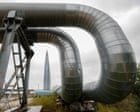TheEuropean Commissionhas insisted there will be no return to Russian gas, as it published plans to phase out fossil fuel imports from its eastern neighbour by 2028.
The EU energy commissioner, Dan Jørgensen, said a proposed ban on Russian gas imports would remain, irrespective of whether there was peace inUkraine.
EU officials recalled when Russia cut gas supplies in 2006,2009and 2014, as well as thedeliberate reduction in flows in 2021before the full-scale invasion of Ukraine, which contributed to a huge rise in energy prices and surging inflation across the continent.
Under the proposals, European companies would be banned from importing Russian gas or providing services at EU liquified natural gas terminals to Russian customers. Any contracts entered into from today would have to be wound up by 1 January 2026, but companies with pre-existing agreements have a final deadline of 1 January 2028.
The proposal is facing a backlash from Hungary, Slovakia andAustria, but these countries are not thought to have enough support to block the plan from becoming EU law.
Jørgensen said plans to phase out Russian fossil fuels were not a response to the full-scale invasion of Ukraine. “This is a ban that we introduce becauseRussiahas weaponised energy against us, because Russia has blackmailed member states in the EU, and therefore they are not a trading partner that can be trusted,” he said. “That also means that, irrespectively of whether there is a peace or not – which we all hope there will be of course – this ban will still stand.”
EU importers will be required to provide customs officers with detailed information about the source of gas to prevent any attempts to sell Russian imports under a new flag.
About 13% of EU gas imports is expected to come from Russia in 2025, compared with 45% in 2021. While Europe has cut supplies of pipeline gas from Russia, in 2024 itbought record amounts of Russian LNG, raising questions about the EU’s commitment to Ukraine and climate goals.
The commission expressed confidence that European companies terminating long-term gas contracts would not be liable for damages. Jørgensen said the EU ban was beyond any individual company’s control. “It is not them who are breaking the contract, it is indeed force majeure.”
The EU also wants to end imports of Russian oil by 2028, compared with 3% today and 27% in 2021.
But the latest proposal does not remove an exemption from the EU’s oil embargo granted to Hungary and Slovakia. When the EU agreed an oil import embargo in March 2023, the central European countriessecured an opt-outthat allowed them to continue to be supplied via the Soviet-era Druzhba pipeline. This carve-out, agreed under the EU’s sanctions regime, cannot be touched by this legislation, which has a different legal basis.
Hungary and Slovakia have sharply criticised the EU plans to phase out fossil fuels. Péter Szíjjártó, the Hungarian foreign minister, claimed Hungarian consumers could pay four times more for utilities, and he posted avideo on social mediaon Monday in which he spoke over a dramatic action movie-style soundtrack. EU officials reject suggestions that prices would go up.
In more muted criticism, Austria’s energy ministrytold the Financial Timesthat the EU should be open to resuming gas imports from Russia if there was a deal to end the war in Ukraine.
However, Lena Schilling, an Austrian Green MEP and formerFridays for the Futureactivist, called the stance shortsighted and morally irresponsible. “Have we learned nothing from bombed hospitals, abducted children and a war of aggression in the heart of Europe?” she asked.
